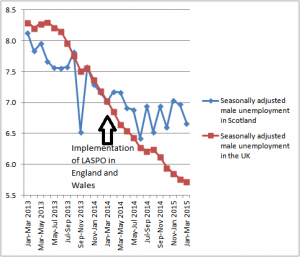Further delays to reforming the Rehabilitation of Offenders Act 1974 in Scotland would restrict the effectiveness of government policies on welfare to work, diversity, health and reducing re-offending .
The news on 20 May 2015 that the Scottish Government are consulting on proposals to change this is very welcome. http://www.bbc.co.uk/news/uk-scotland-32800432
Recruit With Conviction employer workshops consistently uncover bias when convictions are disclosed to recruiters. The employer workshops also show that recruiters need both empowerment and authorisation to select applicants who disclose their criminal convictions.
However, employers should be at the heart of designing safe and sustainable employment solutions, so we warmly welcome this approach by the Scottish Government to listen to the voices of the business community.
Beyond this, minor criminal convictions commonly correlate with long term unemployment and poverty – clearing minor convictions faster is a pragmatic solution to help more people find work and stay in work.
Changes to the 1974 Act were implemented in England and Wales on 10th March 2014. They generally shorten the length of time that convictions can be considered for the purpose of recruitment for most jobs.
The changes helped Tracy from Wigan. She was arrested for holding a small quantity of drugs at a music festival and fined £300 in court in April 2013 when she was a student.
Under the changes to the legislation in England and Wales, fines normally become spent after 1 year which was great for Tracy. She graduated in June 2014 and so she had full protection from discrimination on the grounds of her conviction when she applied for work.
However if Tracy had applied for a job in Scotland, then she would need to disclose this conviction for 4 more years under the terms of the 1974 Act.
1 in 3 men and 1 in 10 women of working have a criminal conviction and even minor historic convictions correlate with unemployment, underemployment and low pay as applicants gravitate to less formal employment where conviction information is not requested by employers.
Therefore reforming the 1974 Act will support the wider welfare to work strategy.
There is also a correlation with minor offences and poverty so the criminal conviction issue is a more common barrier to finding work for people in the poorest communities. To compound the problem, areas of high unemployment and deprivation make the dynamics of local labour market favour employers rather than applicants. Our experience of working with employers in different areas has demonstrated examples where more employers in Aberdeen are better prepared to accept people with complex convictions. In sharp contrast there are employers in North Ayrshire who use criminal record disclosures as an automatic de-selection tool because they receive too many applications. Dr Colin Lindsay at Strathclyde University has also undertaken research which shows that employers deploy more diverse recruitment practices in areas of low unemployment.
The problem of de-selection also relates to spent convictions because filtering of minor convictions do not apply for people with Scottish Convictions. This is a concern for anybody applying for a job which is exempt from the provisions of the 1974 Act. Care work is a common career aspiration and the failure of Scottish disclosure systems to filter out some of the irrelevant convictions causes another specific barrier.
While Tracy from Wigan was never a chaotic drug user, Brad from Liverpool has a history of chaotic drug use and was convicted a number of times for various minor offences. All of his convictions relate to periods of time when his drug use was at its worst.
Recruit With Conviction delivered training to a number of Drugs workers in Merseyside and set out opportunities where changes in the 1974 Act could be used as an incentive in recovery where many individuals have a long history of minor convictions and no prison sentences. With a short rehabilitation period, people in recovery can look forward to an achievable time frame when their record is (sort of) wiped clean. This is very powerful emotionally for people in recovery who harbour a deep sense of guilt about their past and it can be used positively. Of course any recovery plan needs to be personalised to an individual but there are clear opportunities for support workers to help bind things together positively.
Even when Brad had a relapse in August 2014, his support worker was able to establish that he’d not stolen anything and he’d not been arrested so his rehabilitation from the criminal system was still intact. Therefore he was able to refocus on drug recovery without having to start all over again and he has also found employment.
Even minor convictions can be a root cause of anxiety and self doubt present a number of barriers to recovery from addictions and mental health problems.
By enabling opportunities for people to compete for employment, people with convictions are more likely to find the right job.
The right job for the right person is a very effective intervention. It can stop the escalation of minor crime turning into more serious crime and it can also provide a valuable second chance for people with more serious convictions who are liberated from prison.
While core improvements need to be made in employer engagement and in employability support, legislative changes have the potential to make a critical contribution.
Note: In 2013 Recruit With Conviction facilitated a number of stakeholder discussion events on reforming the 1974 Act on behalf of the Scottish Government.
